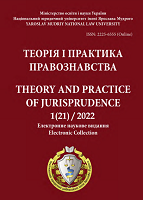України і країн Балтії: порівняльний аналіз
Succession of Ukraine and the Baltic States: comparative analysis
Author(s): Olena ZinchenkoSubject(s): Regional Geography, History of Law, International Law, Transformation Period (1990 - 2010)
Published by: Національний юридичний університет імені Ярослава Мудрого
Keywords: succession; Ukraine; Latvia; Lithuania; Estonia;
Summary/Abstract: In the early 1990s, Ukraine and the Baltic states gained independence. This put them in front of the need to choose the succession - the Soviet or pre-Soviet republics. Ukraine inherited the Constitution of the USSR of 1918-1978, the Baltic States - the republics that existed before their occupation in 1940. This approach to solving the problem led Ukraine and the Baltic States to the opposite results of comprehensive development. The raised topic is too relevant, as the election of Ukraine to the succession of the Soviet constitutions of 1918-1978 proved to be a destructive factor in statehood. The purpose of the study is to identify the features of Ukraine's succession. To achieve this, the Basic Laws of the USSR of 1918-1978, as well as scientific methods and principles of research were used. The main of them was a comparative analysis of the subject of study, which was the core of achieving this goal. Its application helped to identify differences in the choice of succession to Ukraine and the Baltic States after gaining independence, its features and practical consequences. The principles of determinism and retrospective analysis ensured the establishment of causal relationships between processes. The systematic method facilitated the consideration of Ukraine and the Baltic States as equivalent units, in accordance with the requirements of which the research problem was formulated. The use of the principle of historicism made it possible to identify the significance of processes in the context of different epochs. The method of objectivity, coupled with the principle of historicism, helped to avoid traditional assessments of events, facts, government, and so on in Soviet science. Structurally complex method, classifications, normative-legal approach, principles of analogy and logical analysis made it possible to divide the constitutions of different states and epochs into separate groups, identify their importance in the study process, formulate general conclusions, establish radical opposition to Ukraine and the Baltic states and identify their specific strategic outcomes. The author came to the conclusion that the peculiarity of Ukrainian entrepreneurship is the entrepreneurship of the Ukrainian SSR, the inability to solve strategic problems of domestic and foreign policy, which have been put forward in recent times. The peculiarity of the succession of the Baltic states was the inheritance of the republics that existed before the occupation in 1940, which created the preconditions for the successful solution of strategic tasks of domestic and foreign policy.
Journal: Теорія і практика правознавства
- Issue Year: 1/2022
- Issue No: 21
- Page Range: 97-117
- Page Count: 21
- Language: Ukrainian

